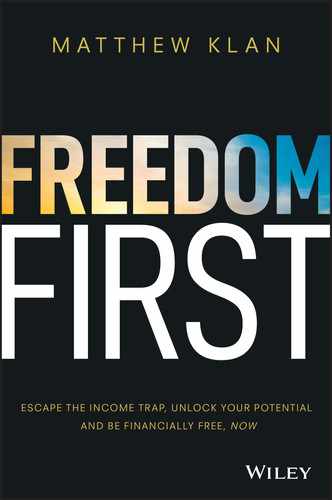CHAPTER 18
The path of Freedom First
A compass not a ladder.
For many people, being free of a job is possibly the biggest freedom they could desire. However, it’s also true that for many people stuck in a job the thought of starting a business is terrifying. Fortunately, this is not ‘Quit Your Job and Start a Business First’. It’s Freedom First. But for those who do find the idea of starting a business attractive but scary, if they are honest and they do a thorough Values Audit, they may find that what’s really difficult for them to give up is the status of their current job, or perhaps the security of it. Many people in this position who don’t realise that it is their values that are holding them back, often say ‘But I don’t have any skills, there’s nothing I do that I could start a business with.’ But we’ve seen that you can start a business with the most basic skills — even based around a hobby you have, and not any ‘formal’ qualification. It’s important to understand and accept what it is that you truly value. Freedom First is a guiding principle. If you want to become financially free, you must get free first. It’s about learning to value your freedom more, not abandoning your other values. Many are stubborn in pursuit of the path they have chosen. Few in pursuit of the goal. Friedrich Nietzsche It’s important to realise that Freedom First is like a compass, and not a ladder. It gives you a guiding principle to apply, rather than a set of predefined steps. A compass, not a ladder Of course we’ve seen that there are certain signposts along the way — certain bearings you can check to ensure you’re moving in the right direction: Freedom First is a principle: you can apply it to whatever area of your life you want — the more the better. And because it’s a compass and not a ladder it’s okay that people may be starting at different levels. It’s not how much money you have, it’s what you do with it. Some people work hard for many years until they’ve ‘saved up enough’ to be investors. But having a million dollars doesn’t mean you can be a big shot investor, it just means you have a lot of capital to invest, or to lose. And if you’ve worked and saved your whole life for that capital, that’s not a strategy you can repeat. On the other hand, if you’ve created your wealth, you can create it again. It’s better to start investing early with a small amount of money and build up your skills and experience than wait years building up your savings and developing no skills. I’ve met some retirees who only really started investing once they had quit work, because they never had the time to do it before. But after waiting their whole lives to buy back all of their time, they’re finding that all it would have taken was enough time to find the first deal and complete it. They could have retired years earlier. What a waste of time! Matthew Klan And it’s not just about money. Hannah Arendt’s book The Human Condition, makes an interesting point that the ancients used to have two words for what we now just call work. There was ‘work’, and there was ‘labour’. Labour was considered almost lowly. It was the activity that you did to make ends meet — you laboured to put food on the table. The effort put into labour was consumed, whereas ‘work’ was often something larger, and lasting, that you could put yourself into: think of ‘great works’ or ‘public works’. Now we call everything we do work, although nearly everything we do is labour — what we create is consumed, either immediately or in the future. Although we are richer than ever before, the ancients would consider us impoverished. Hardly any of us get to step back from ‘labouring’ to look at the big picture and truly work towards something bigger than ourselves. If you could free yourself from the short term — free yourself from ‘labouring’ to make ends meet — what great work could you be capable of? I’m reminded of the story of the Parable of the Talents (Matthew 25:14–30) where a rich master leaves his servants to watch over his money, or ‘talents’, while he’s away. In the story, the servant who does the most with the money he is left in charge of, is rewarded the most, while the servant who chooses to take no risks but instead keeps the money he was left safe, is punished. ‘So take the bag of gold from him and give it to the one who has ten bags. For whoever has, will be given more, and they will have an abundance. Whoever does not have, even what they have will be taken from them. And throw that worthless servant outside, into the darkness, where there will be weeping and gnashing of teeth.’ Harsh. The story talks about ‘talents’: ‘he gave five talents to the first servant’ etc. A talent in this instance is usually interpreted as a measurement — so a talent could be one measure of silver, or one measure of gold. But I like to think that this story can be about more than just money: we are all born with unique talents that are ours to use or waste. What is your story? What are your unique talents? In what ways could you be freer right now, and what could being freer allow you to do, to be, to create? The greatest asset we all have in common with each other — that we can invest or waste — is time. There’s no better time to buy back your time, than now.
